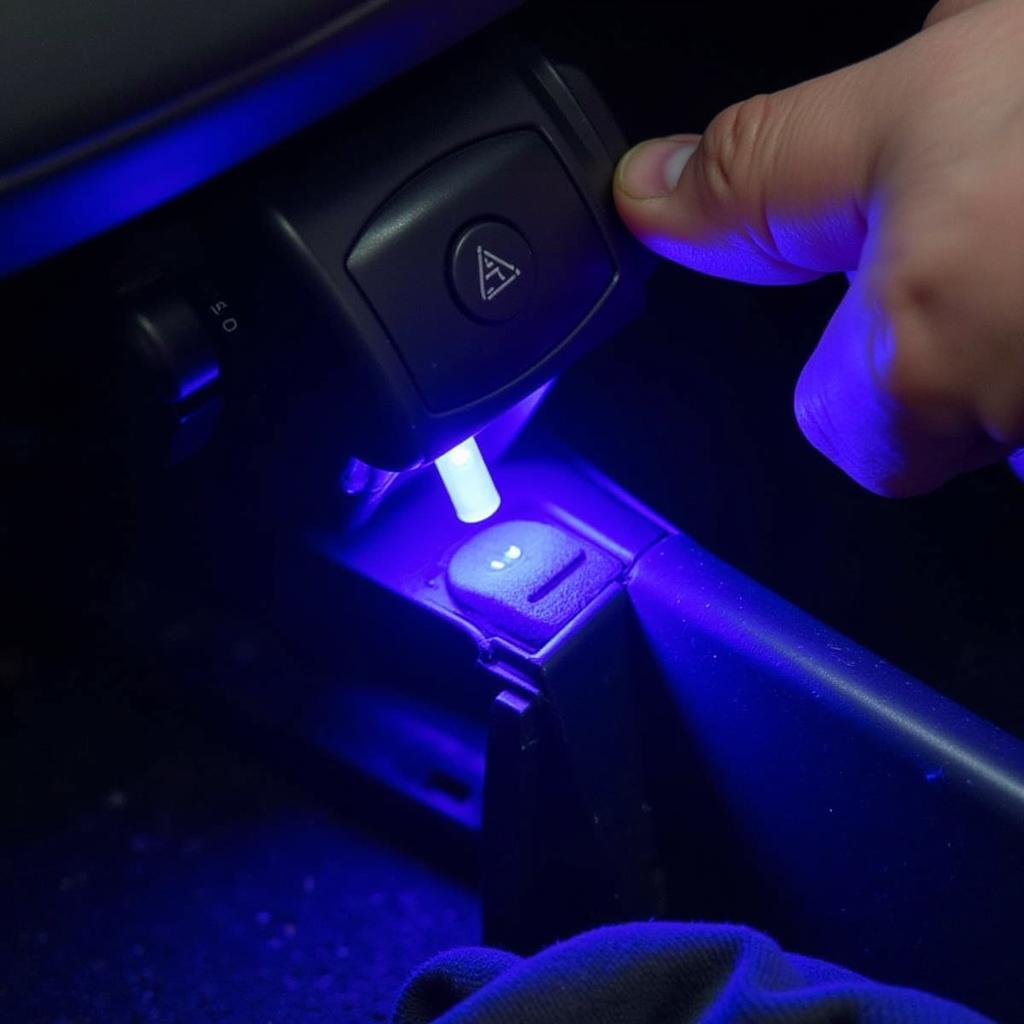In the sweltering heat, a malfunctioning car AC system can make driving unbearable. Whether you’re a DIY enthusiast or prefer leaving it to the pros, understanding common car AC issues and how to address them can save you from sweaty discomfort and unexpected repair costs. This guide will equip you with the knowledge to conquer those hot days and keep your car a cool oasis.
Common Car AC Problems and Their Causes
Before you call the car air con fix near me, it’s helpful to identify the root of the problem. Here are some frequent culprits:
1. Refrigerant Leaks
Just like a refrigerator, your car AC relies on refrigerant to cool the air. Leaks are a common issue, often occurring at hose connections or within the evaporator.
Signs of a leak:
- Gradual decrease in cooling performance
- Hissing sound when the AC is on
- Oily residue near AC components
 Car AC Refrigerant Leak Detection
Car AC Refrigerant Leak Detection
2. Electrical Issues
Electrical components play a crucial role in your car’s AC system. Malfunctioning switches, blown fuses, or a faulty blower motor can disrupt the cooling process.
Signs of electrical problems:
- AC system blows air, but it’s not cold
- AC controls are unresponsive
- Burning smell from the AC vents
3. Compressor Failure
The compressor is the heart of your AC system, responsible for compressing and circulating refrigerant. A worn-out compressor or a damaged clutch can bring your cooling to a halt.
Signs of compressor failure:
- Loud noises when the AC is engaged
- AC intermittently blowing cold air
- No cold air at all
4. Condenser Problems
The condenser acts like a radiator for your AC system, releasing heat absorbed by the refrigerant. Damage to the condenser fins or blockages can impede its efficiency.
Signs of condenser problems:
- Reduced cooling efficiency
- Overheating engine
- Visible damage to the condenser fins
Troubleshooting Your Car AC
While some AC repairs require professional expertise, there are a few things you can check yourself:
1. Check the Fuses
Locate your car’s fuse box and consult your owner’s manual to identify the AC system fuses. Inspect them for any signs of damage or a blown fuse.
2. Inspect the Drive Belt
The AC compressor is typically driven by a belt connected to the engine. Ensure the belt is in good condition, properly tensioned, and not slipping.
3. Clean the Condenser
Over time, debris can accumulate on the condenser fins, hindering heat exchange. Gently clean the fins using a soft brush or compressed air.
When to Seek Professional Help
If your troubleshooting efforts don’t resolve the issue, it’s time to consult a professional. For expert assistance, consider contacting a reputable ac car fixer near me.
“Attempting complex AC repairs without proper knowledge can lead to further damage and costly repairs,” advises John Miller, a certified automotive technician with over 15 years of experience. “It’s always best to leave intricate diagnostics and repairs to trained professionals.”
Preventing Future Car AC Problems
Regular maintenance can prevent many car AC issues. Here are some proactive measures:
- Schedule annual AC inspections and service
- Address any refrigerant leaks promptly
- Keep the engine bay clean
- Run your AC for a few minutes every month, even in winter
Conclusion
Keeping your car AC in top shape ensures a comfortable ride on even the hottest days. By understanding common AC problems, you can troubleshoot minor issues yourself and know when to call in the experts. Don’t let a faulty AC system ruin your summer drives – stay cool and comfortable behind the wheel.
Need expert help with your car AC? Contact AutoTipPro at +1 (641) 206-8880 or visit our office at 500 N St Mary’s St, San Antonio, TX 78205, United States. Our team of experienced technicians is here to keep your car cool and comfortable year-round.





Leave a Reply